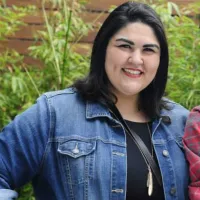
One-on-one with Martin Kampmann
Dr. Martin Kampmann joined the faculty at UCSF in 2015 as the first openly LGBT professor at Mission Bay campus, established in 2003.
Driven by an initial childhood fascination with the human brain, Kampmann’s lab uses approaches in biochemistry, biophysics, and cell biology to probe cellular proteostasis networks and how they are challenged in neurodegenerative diseases and cancer.
After completing a B.A. and M.A. in Biochemistry at Cambridge University, Kampmann went on to earn a Ph.D. in Biological Sciences at The Rockefeller University in 2009.
Next, he performed postdoctoral work in Dr. Jonathan Weissman’s lab here at UCSF before starting his own lab as an Assistant Professor in the Department of Biochemistry and Biophysics and member of the Institute for Neurodegenerative Diseases.
The following is a lightly edited transcript from an interview with Kampmann detailing his transition from trainee to faculty at UCSF, how he uses his voice to increase LGBT visibility in academia, and the importance of being a good person in addition to being a good scientist.
Was there a first experience that made you excited or curious about science?
Actually, I do remember very distinctly one point when my sister was watching something on TV that talked about how scientists were able to read peoples’ brain waves and maybe figure out what they were seeing, visually.
I thought, “Isn’t that cool that you could have some physical measurement that connects to consciousness, thoughts, emotions?”
I read books on it as a teenager and took classes on it in college until I realized that this whole question is a very big one, and perhaps more philosophical as opposed to scientific. Then I actually switched and very much focused on biochemistry and structural biology.
Interestingly, I’ve come a bit full circle. I’m now working in the field of neurodegeneration, connecting again with some of my initial fascination with how the human brain works.
Tell me a little bit more about your first experience in the laboratory.
In college, I did a summer internship in a crystallography lab.
The original project never worked out, so that was one experience: that science is actually frustrating and a lot of the time it doesn't work right away.
However, in the process, I came up with a small experiment that I wanted to do by myself. It was only partially related to what the lab was actually doing, but the PI encouraged me to just try it out.
I got some promising results and he let me pursue them until eventually he said, “Wow, you could publish this. Why don’t you go publish it?”
It was so motivating for me that I could come up with my own ideas and they could actually go somewhere.
Would you say that there is one piece of advice you have gotten that has guided you to where you are now?
You have to have a curiosity about the science you do and you must make sure not to lose that enthusiasm.
Being in science is tough: you have to have a very high tolerance for frustration and things often don't work.
Certainly, for many years while you are a graduate student or a postdoc, you don’t ever make the same kind of salaries that maybe your friends that went into Business are making.
So, why are we in this? We’re in this because we are enthusiastic about doing science.
We just enjoy it. You have to keep that enthusiasm and continue to be curious.
Is there anything that is most surprising about between being faculty versus a trainee?
[Laughs] Yeah, many of my days now are actually back-to-back meetings, which is very different from being a trainee where you do science with your own hands!
There are pluses and minuses.
I do miss the excitement of doing experiments and seeing the answer first-hand. At the same time, I love interacting with people.
I think, once you start to grow your own group, it’s beautiful to see how the diversity of people always brings new ideas and new perspectives that you might not have had yourself.
Having these different interactions with people in my group and beyond with collaborators is really broadening the way that I think about science and the scope of what I can do.
What do you think is the biggest challenge in recruiting a diverse next generation of scientists?
Great question. For anyone to say, “I want a career in science,” is a huge decision.
It is daunting because there is such a long training period and the path that you take in science depends on a lot of decisions that are hard to predict — whether you pick a project that ends up being a phenomenal success or whether the project doesn't work out?
I think it’s much harder if you come from a background where science is something that nobody in your family has done or that nobody you know has ever done.
So, any kind of outreach, any kind of visibility of underrepresented scientists can be a very important factor.
Starting at early stages, including college and even high school, to show people that there is a broad diversity of scientists. They don’t all look the same and, if you want this, you should give it a shot.
Can you comment on the visibility of LGBT scientists today?
Absolutely, it is a topic close to my heart. I think the LGBT identity is different from other underrepresented identities in that people can choose whether or not to be out.
However, hiding who you are is a constant burden, and it’s very important for people to feel that they can be who they are in a work environment or science environment to really contribute in the most open and positive way.
That is why I support the Graduate Queer Alliance and other related groups as much as I can.
Not because I think that being gay in science has ever been something that has actually held me back personally, but I do think that it can be something that other people feel uncomfortable or insecure about.
I think by being out myself, hopefully, I can help to encourage other people. We still have a long way to go in terms of trans people and also those who are LGBT in addition to being a person of color.
The more visibility and the more role models we have, the better.
Are there any scientists, living or dead, that you are particularly inspired by or that you admire?
It’s interesting. I’m usually not somebody who is into, kind of hero-worship. [Laughs]
I have certain qualities that I really admire in different people, so I have a hard time mentioning a specific hero, I guess.
Although there are clearly amazing people, right? Who I do admire are scientists that manage to do really great science and at the same time be really good human beings.
I think that is quite an achievement and it’s something that is not always so visible.
Of course, people who are close to them, like their trainees will know, but it’s not necessarily something that would be reported in scientific journals or history books or Wikipedia.
Beyond the monumental discoveries they made, I admire somebody that also managed to be a good mentor or a positive human influence on the people around them.
I think, in some sense, that is what I hope to aspire to be.



